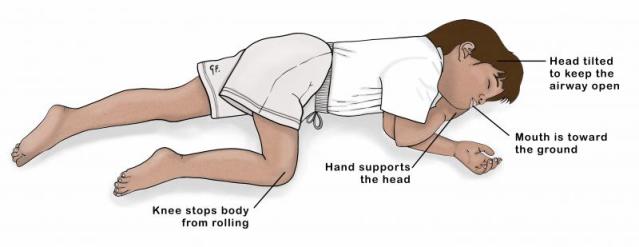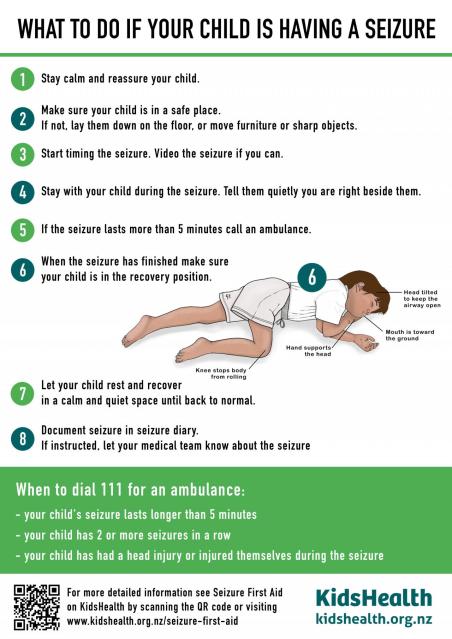A short animation on first aid for when a child has a seizure.
Source: Epilepsy Action Australia
Key points about seizure first aid
- stay calm - remember the seizure will stop
- turn your child on their side so they will not choke on saliva or vomit
- time the seizure - if it lasts more than 5 minutes call an ambulance (dial 111 in New Zealand)
What should I do during my child's seizure?
Stay calm
Try to stay calm - remember it will stop. Your child is not going to die and it is not damaging their brain.
Clear a safe space around your child
Clear a safe space around your child and protect their head if there are jerking movements. You may need to lie them down on the floor (or move furniture away from them).
Turn your child on their side
Turn your child on their side in the recovery position, so they will not choke on saliva or vomit. You may need to wait until the jerking stops to do this.

An illustration demonstrating a child in the recovery pose.
Time the seizure
Try to take note of the time the seizure started. If the seizure lasts more than 5 minutes call an ambulance.
Make sure your child is safe
Loosen tight clothing.
Do not put your fingers or anything else in or near your child's mouth - your child may bite your fingers as part of the seizure.
Do not try to stop your child's movements.
You do not need to worry about your child swallowing their tongue. This does not happen.
Make sure your child is in the recovery position.
Stay with your child
Stay with your child during the seizure. Tell them quietly that you are right beside them and you will keep them safe.
When to dial 111
Dial 111 within New Zealand (use the appropriate emergency number in other countries) and ask for urgent medical help if your child has:
- a seizure that lasts more than 5 minutes
- 2 or more seizures in a row without waking properly between them
- had a head injury
- an injury during the seizure
Emergency seizure medicine
If your child has had a seizure that lasted longer than 5 minutes in the past, the doctor may give you a medicine to stop a seizure. This is sometimes called ‘rescue medicine’. You can give this to your child for a seizure that lasts longer than 5 minutes.
Emergency Epileptic Seizure Medicine
Video your child if you can
If you can, or there is someone with you, try to get a video of the seizure with your phone to show your doctors.
What to do after your child's seizure
Put your child in the recovery position
If you couldn't put your child in the recovery position during their seizure, do this as soon as it’s over.
Let your child rest in a quiet place
Let your child rest and recover for a while in a calm and quiet space. They may remain confused, feel strange and have sore muscles or a headache for some time afterwards.
Give pain relief if needed
If your child has bitten their tongue, paracetamol and an ice block can help (when they are awake enough to have them). When giving paracetamol, follow the dosage instructions on the bottle. It is dangerous to give more than the recommended dose.
Write down what happened
Write down the details of what happened to your child (before and during the seizure) so that you can remember what to tell your doctor. Record this on a calendar or seizure app.
See the KidsHealth page on keeping a record of seizures for more information.
When to get medical help after your child's seizure
If you think your child has had a seizure for the first time, you should see a doctor urgently.
If your child has had a previous seizure and has another one, but has fully recovered, you don't usually need to call a doctor immediately or call an ambulance.
Tell your doctor that your child has had another seizure.
Most tamariki (children) who have 2 seizures will go on to have more seizures. Most tamariki need anti-seizure medicine if they’ve had 2 seizures. This is to help prevent further seizures. The specialists will talk about the options with you.
Printable emergency seizure plan for seizure first aid
This emergency seizure plan is a step-by-step guide for what to do if your child is having a seizure.
Keep a copy on the fridge or where everyone can see it.
Preview

Available formats
Source: KidsHealth
Source: KidsHealth
Acknowledgements
Illustration of child lying on their side in the recovery position by Dr Greta File. Property of Kidshealth.
The content on this page has been developed and approved by the Paediatric Neurology Clinical Network, Paediatric Society New Zealand.
